Neil Whittaker: 25 years since ARL and Super League broker peace in rugby league’s ugly civil war
On the 25th anniversary of the ARL-Super League war ending, peace broker Neil Whittaker relives the moment he had to break George Piggins’ heart.
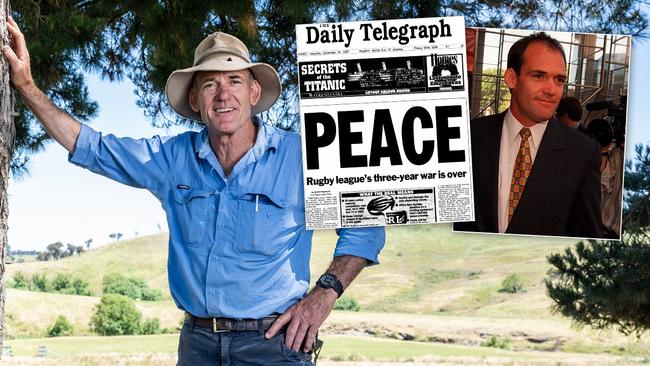
NRL
Don't miss out on the headlines from NRL. Followed categories will be added to My News.
The man who brokered peace in rugby league’s most bitter battle has declared they “underachieved” in rationalising the competition and that more Sydney clubs should have merged following the ARL-Super League war.
A fortnight out from the 25th anniversary of the end of the three-year, $1 billion war which threatened to destroy rugby league, former ARL chief executive Neil Whittaker opened up to The Daily Telegraph about the “extraordinarily difficult” merger talks, the tough call to George Piggins to expel South Sydney from the competition and how the Rabbitohs’ axing proved a blessing in the long run.
He also warned the current NRL administration about their expansion plans.
Whittaker, now 66, played 118 games at hooker for Balmain between 1979 and 1985. He now lives a life totally foreign to when ARL chief executive in 1997 when thrust into peace talks with then News Ltd director of sport, Ian Frykberg.
Instead, Whittaker now splits his time between living on Sydney’s northern beaches and running a 1000-acre farm in Laggan, eight kilometres northeast of Crookwell in the NSW southern tablelands, where few locals realise what he achieved in 1997.
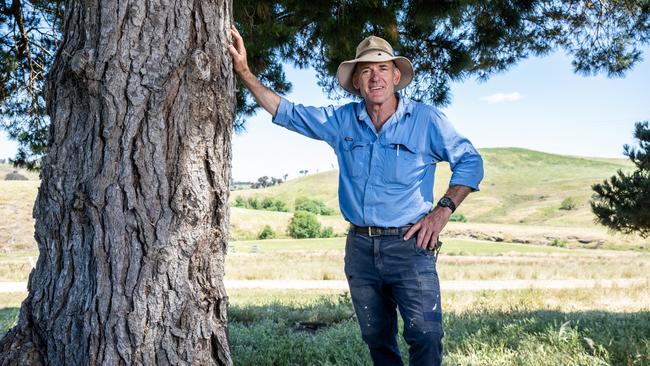
DECLARING WAR
All hell broke loose on April Fools’ Day in 1995, when Super League’s rebel competition began poaching clubs from the ARL, which had just expanded to a 20-team competition.
Through court cases, acrimony and blown cash, dual competitions were run in 1997 — a 12-team ARL and 10-team Super League — before both sides found much-needed peace.
“The rumours around the death of rugby league through the three years of Super League were greatly exaggerated because it all ended pretty well, didn’t it?” Whittaker said.
So who won the war?
“The best way to answer that came from one of my chairmen at the time. He said ‘in 10 years’ time no-one will care who won the war because the game will be in such great shape’,” he said.
“The game won. A lot of people were successful as a result of it and a lot were aggrieved by it. Change is difficult and change was thrust upon us and I think we came out of it in reasonable shape.
“For Sydney clubs, it was tough. But it was going to be tough with or without the Super League war. It just accelerated things.”
THE PEACE DEAL
The war officially ended at 3.40pm on Friday, December 19, 1997.
Under the peace deal, there would be a united, 20-team competition in 1998 before culling of the competition would begin. The Hunter Mariners, Perth Reds and South Queensland Crushers were axed immediately, while Melbourne joined the competition. The Adelaide Rams and Gold Coast Chargers were then dumped as St George and Illawarra merged for the 1999 season.
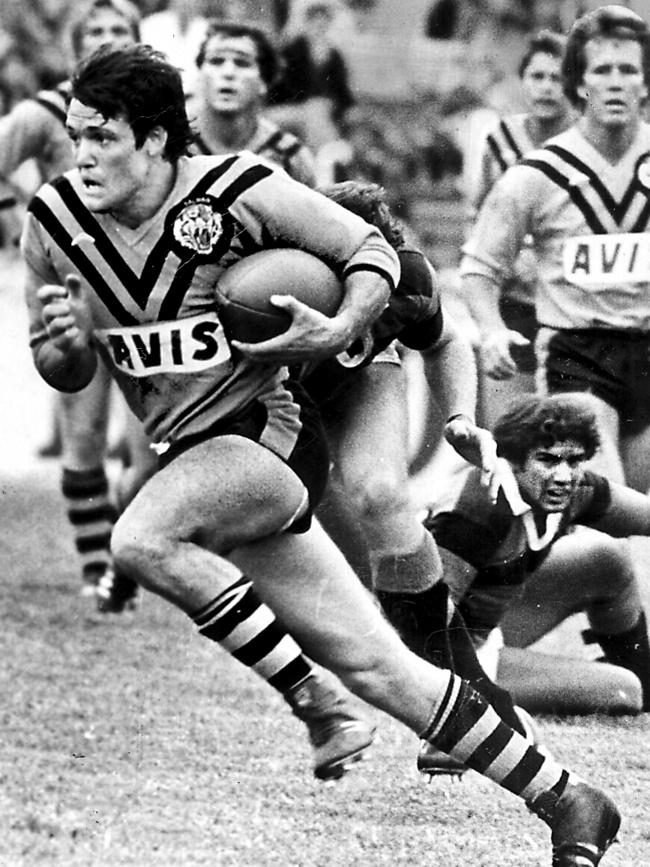
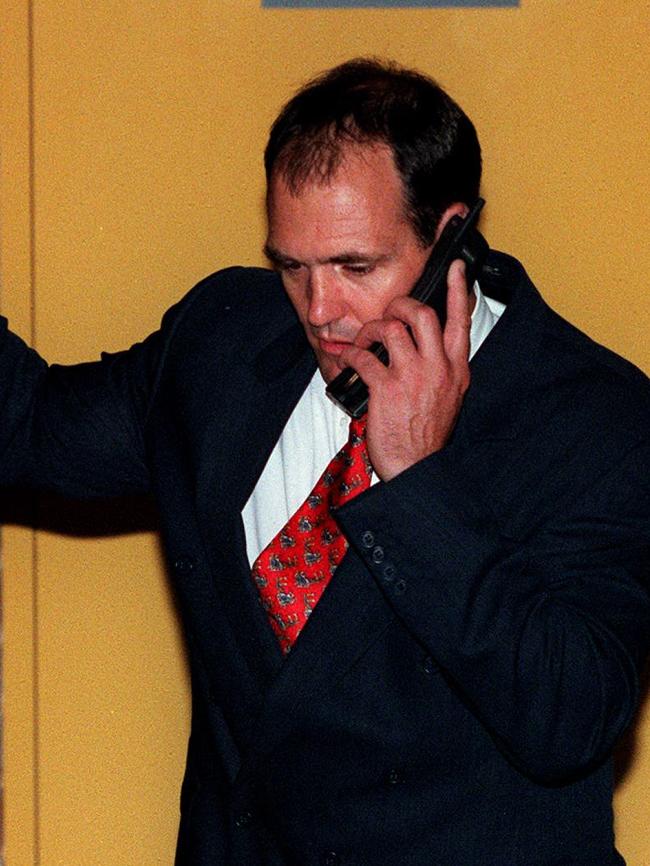
MERGED CLUBS
In a frantic scramble to survive, in some form under the 14-team quota, Manly amalgamated with North Sydney and Balmain and Western Suburbs joined forces before the 2000 season.
According to Whittaker, there should have been more.
“There were a lot of talks around mergers before I started. I think we underachieved in the number of mergers. I thought there would be more,” he said.
“Some clubs would say they went to Super League and got enough money to get through that phase. I know ‘Frykers’ (Frykberg) expected more mergers so everyone had a place in the game.”
As part of the peace deal brokered in 1997, Sydney clubs were to be reduced to eight or six by the year 2000, with attractive merger incentives offered.
Parramatta briefly explored the prospect of merging with Balmain, before then-CEO Denis Fitzgerald pursued a Penrith joint venture that would create a western Sydney powerhouse. The Panthers board voted down the proposal 5-4.
“There were a lot of clubs along down the track (in merger talks) before I got there,” Whittaker said.
“It was a very fluid situation. Everyone was trying to work out which side they were on and whether they needed to merge.
“There was more activity than people think. There were boards split everywhere over what they wanted to do. It was an extraordinarily difficult time.”
SOUTHS AND GEORGE
But the worst was yet to come.
The three mergers left South Sydney as the odd team out, failing the criteria set for survival, and condemning them to expulsion from the NRL.
Asked to describe the reaction from Rabbitohs chairman and club legend George Piggins, Whittaker said: “Unhappy and rightly so.
“Anyone would have been unhappy but, to a large extent, it was the catalyst for change at Souths, which has turned out to be very successful.
“Souths could have thrown their toys out of the cot and got upset but they got on with it. And to a fantastic extent, it has worked very well. Good on them.”
Whittaker spoke of the day he rang Piggins to reveal the bad news.
“I made the call to George – I’ve had easier phone calls,” Whittaker said.
“But I could have talked to more difficult men.
“I had to make the phone call and I got blamed for it (the club’s expulsion) but I didn’t manage it all on my own. I only administered a process. It could have been anybody but it was them.
“I knew it had to be me that made the call and George was grateful it was me who rang him. It was a difficult call but there were a lot of difficult calls around that time. George was gracious, he’s a champion.”
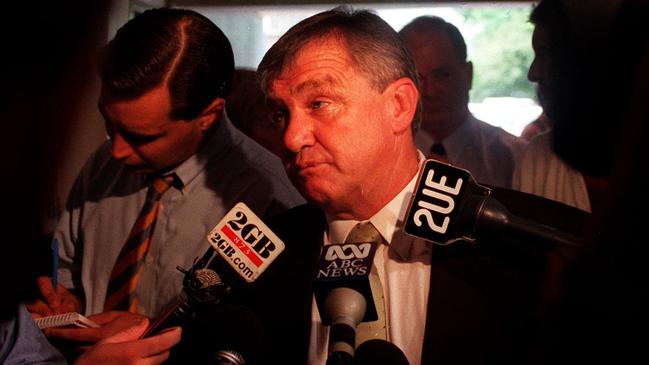
HERO OR VILLAIN
Whittaker did a remarkable job, but there were always going to be critics – even from his own side, the ARL.
“Depends who you talk to,” he said. “That’s a tricky question. It was pretty obvious before I took the job that I wouldn’t (please everyone).
“The best way for me to answer it is that everybody was looking for my agenda and my agenda was to get the game back together. A lot of people got themselves confused from that.
“I took a job to try and guide us through the disaster and that’s what I focused on. If people were aggrieved by that; that was always going to be the case.
“I worked on the theory that if I played a straight bat, did a good job, then the right people would see that. Look, I’m proud of what we did. Very proud and I’m pleased I did it. I don’t have any regrets for taking the job.
“It was never going to be easy but someone had to do it. And it was better that someone from within the game did it. If it wasn’t me it was going to be someone else.”
25 YEARS ON
Whittaker has no plans to celebrate the milestone. He remembers only three ARL officials gathered for the 20-year anniversary.
“Three of us got together (Whittaker, Geoff Carr and John Brady) after 20 years and had a couple of beers but everyone seems to have moved on. We don’t worry about it that much,” he said.
“We were the three that basically brokered the whole thing in 1997 – they are great men. Until you mentioned it, I had forgotten all about the fact it was the 25th anniversary.
“I ran the NRL for the first two years and then stepped away. They wanted me to settle it down. I was never a sports administrator, that’s for sure. I don’t miss it one little bit. I never needed it.”
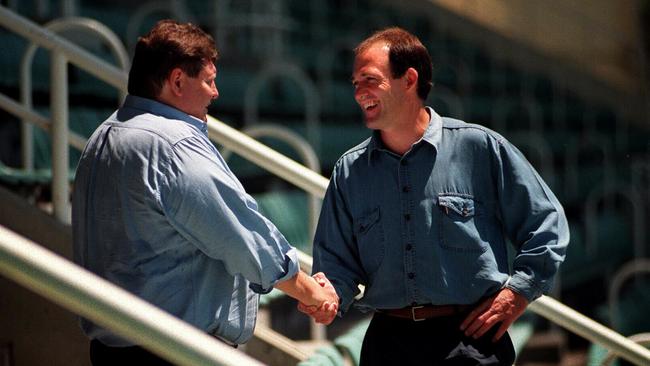
FEISTY FRYKBERG
News Ltd drafted Frykberg – an influential and hard-edge negotiator – to end the war.
“‘Frykers’ was a champion,” Whittaker said of Frykberg, who sadly passed away in 2014. “Thank God he was there. Without him, there was going to be a mess.
“He knew very early on that it had to be sorted and it had to be sorted in a collaborative way, rather than a ‘winner, loser’ way. I had early confidence in him and I hope he did in me.
“Once we worked out we were both trying to get the same outcome … it was really hard but having a like-minded person on the other side helped enormously.
“He had a massive personality and took no rubbish from anybody. He was a straight shooter who everyone liked.
“‘Frykers’ had a subtle way of delivering headbutts. He was an old rugby front-rower. I worked out early on when I was receiving a headbutt and he probably worked out early on when I was telling him what we couldn’t do.
“I had a tremendous amount of respect for Ian and I hope he respected me. There were days when he was copping more flak from his side than our side.”
NRL CIRCA 2022
“The game today is what it is, perhaps, because of what we did,” Whittaker said.
“I love the game. We took some serious risks in that (peace) deal so the game would emerge independent and strong.
“And that’s exactly what happened. It played out exactly as ‘Frykers’ and I agreed it would.
“We got through it with only one split season, which was a bonus, judging by where the game is 25 years later. It’s not going too bad.
“Sydney sides are all flourishing. The whole thing has found its own level.”
EXPANSION CONCERNS
In 1995, the ARL was a 20-team competition. With the Dolphins becoming the NRL’s 17th club next season, Whittaker offered an expansion warning.
“I’m not sure about it. I worry about the size of the player pool,” he said.
“I don’t know the economics so I shouldn’t have a view because I’m not close enough to it – and I don’t want to pick a fight with anyone – but just standing back as a punter, I worry we don’t end up in any form of deterioration.
“People will work it out. You can’t start hiding games with the way the broadcast rights are now.
“You don’t want players that aren’t up to it getting big money. You want the good players getting more money. That’s my attitude. It will be interesting to see how the Dolphins go. I think it’s a big call.
“I’m a little bit old-fashioned and think there should be more effort in building the funnel out of the juniors so we can protect the quality of the main comp. That’s really, really important but if expansion works, good luck to them, well done.”
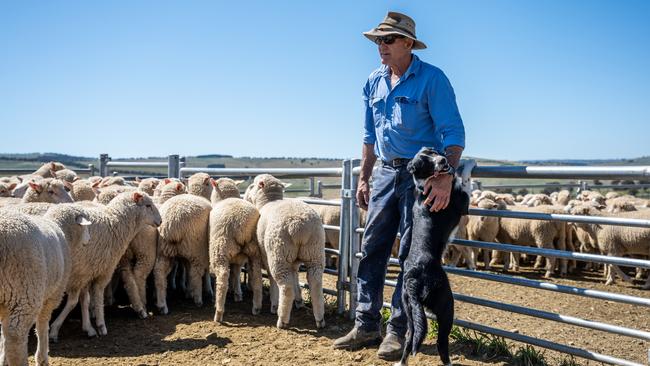
LOVELY LAGGAN
It’s a tiny hamlet offering up idyllic country life for its 358 locals.
There’s a guesthouse, sculpture garden, lavender farm, three churches and every third Saturday, village markets at the local memorial hall offer old-fashioned knick-knacks from home-baked cakes to crochet and knitting.
Walk past the quaint local pub, an old wooden dwelling established in 1924, where the beer garden extends onto the local street, and you wouldn’t look twice at the lean bloke having a few quiet weekend beers.
Dressed in jeans, a wide-brim hat, long-sleeved blue shirt and working boots sits Whittaker.
His corporate suits and credit cards have been replaced by sheep, livestock and Rex, his trusty sheep dog.
Whittaker hails from Crookwell. His wife, Liz, was raised on the adjoining property.
“We’ve got a 1000-acre farm, which is 400 hectares in the new money, and run exclusively sheep, mainly for merino wool,” Whittaker said.
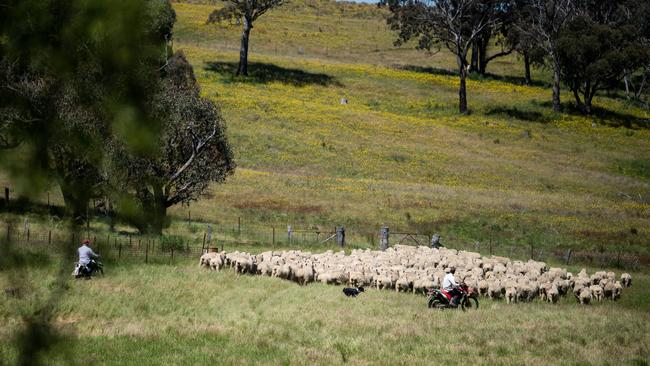
“We have about 3000 sheep and lambs.
“Today, I’ve been mustering sheep. It’s mostly sheep work, fencing or planting crops – doing what you have to do to keep the joint running; just normal farm work, it’s fantastic, it’s busy.
“Rex is the second in charge. It is very hard to manage a property like ours without a good dog like him. We try to spend about 50 per cent of our time down here. We love it.
“I grew up and went to school in Crookwell. I was from in town but the farm opportunity came up and we were looking for something to do that was a bit different and for our families to get involved in.
“There are about 40 people who live in Laggan and almost everyone in Australia knows about it. I get down to the local pub as much as I can. It’s a good place to meet up with the locals.
“It’s a great place down here. Liz and I grew up here so we know a lot of people and it’s been lovely to come back. There is a lot of familiarity.”
More Coverage
Originally published as Neil Whittaker: 25 years since ARL and Super League broker peace in rugby league’s ugly civil war





